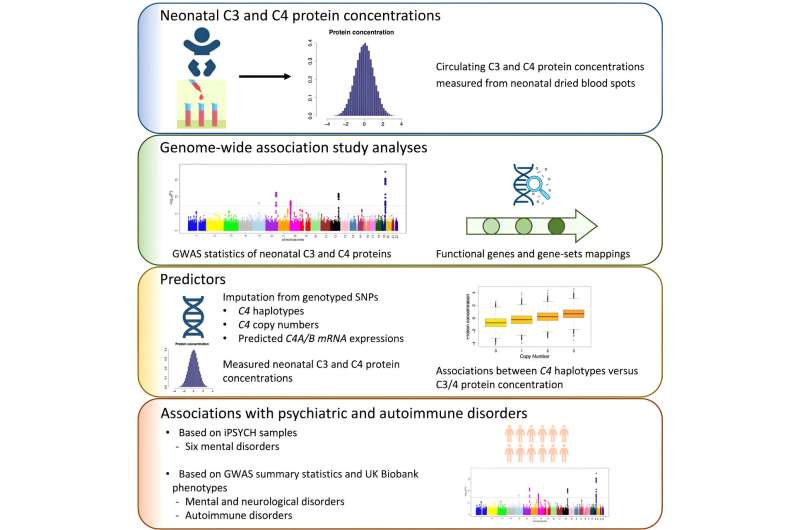This article has been reviewed according to Science X's editorial process and policies. Editors have highlighted the following attributes while ensuring the content's credibility:
fact-checked
peer-reviewed publication
trusted source
proofread
Unraveling the association between neonatal proteins and adult health

Research led by Professor John McGrath from the University of Queensland found that the concentration of the C4 protein, an important part of the immune system, was not associated with risk of mental disorders.
However, the research also showed that a higher concentration of the C3 protein reduces the risk of schizophrenia in women, and studies based on the genetic correlates of C4 found strong links with several autoimmune disorders. The study was published in Cell Genomics.
Professor John McGrath from UQ's Queensland Brain Institute said his colleagues at Aarhus University in Denmark looked at two complement components linked to schizophrenia and autoimmune disorders.
"These complement components are proteins that work with your immune system, helping to protect your body from infection and autoimmune disorders.
"We studied the link between two protein concentrations—C3 and C4—in over 68,000 newborn babies and the risk of developing six mental disorders later in life," Professor McGrath said.
"A growing body of evidence links C4 to brain development, which could subsequently have implications for the risk of mental disorders.
"However, in our study, we found no associations between C4 concentration and mental health disorders.
"In an expanded sample, we found higher C3 concentration was associated with a reduced risk of schizophrenia in females only."
The research team also examined the link between the genetic correlates of these two proteins and the risk of autoimmune disorders, finding that C4 was linked with an altered risk of five types.
"Higher C4 concentration was associated with a lower risk of several autoimmune disorders and a higher risk of others," Professor McGrath said.
"The mechanisms underpinning the links between C4 and the increased or decreased risk of autoimmune disease are not well understood yet.
"We hope our findings will guide future research into the association between these two complement components and health outcomes."
More information: Nis Borbye-Lorenzen et al, The correlates of neonatal complement component 3 and 4 protein concentrations with a focus on psychiatric and autoimmune disorders, Cell Genomics (2023). DOI: 10.1016/j.xgen.2023.100457
















